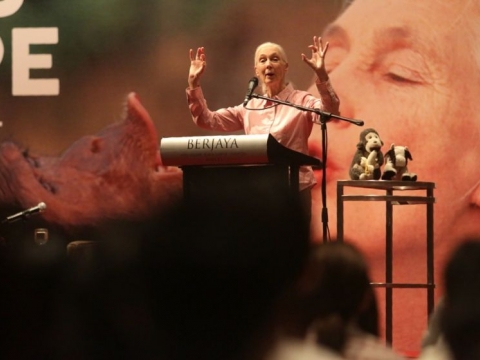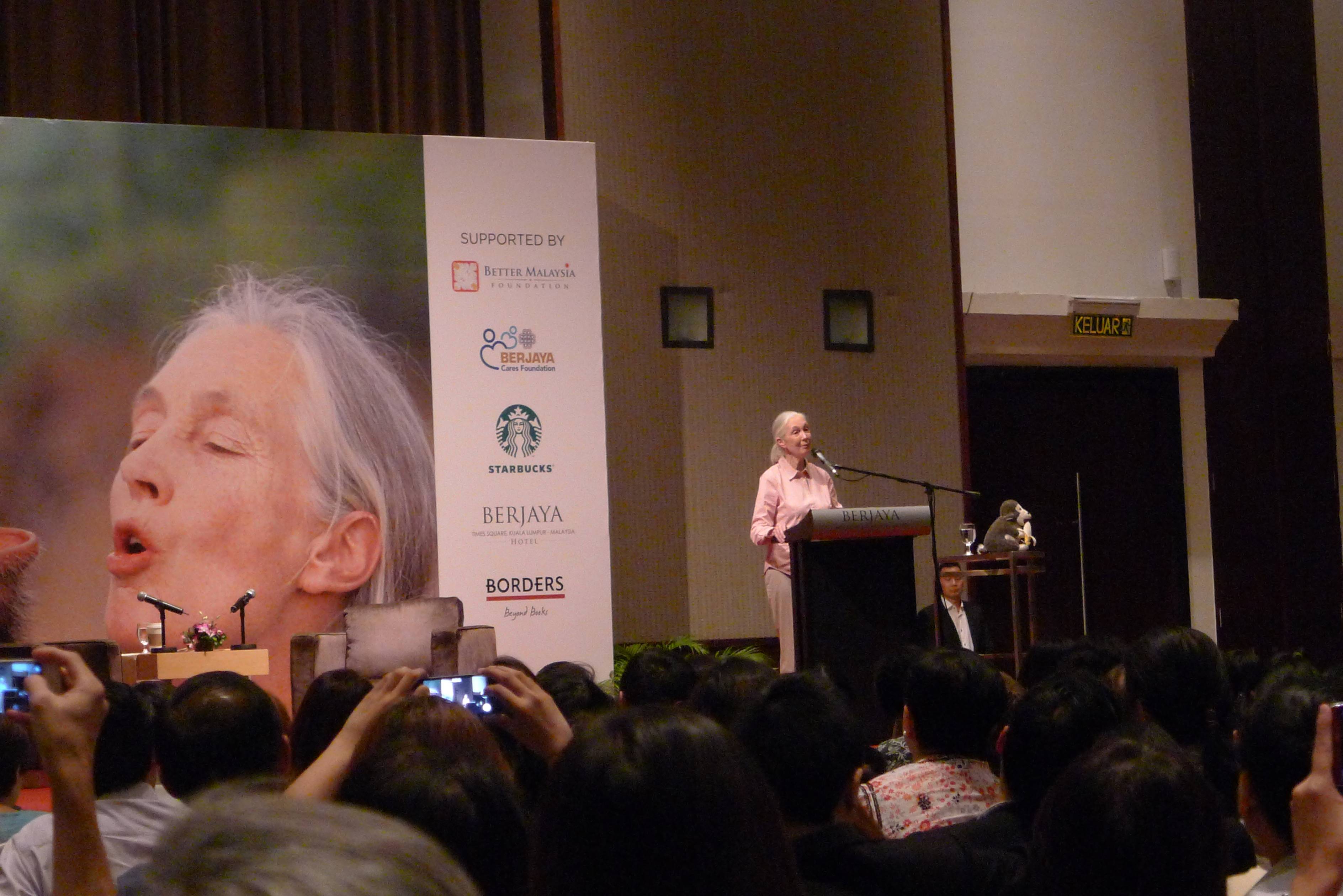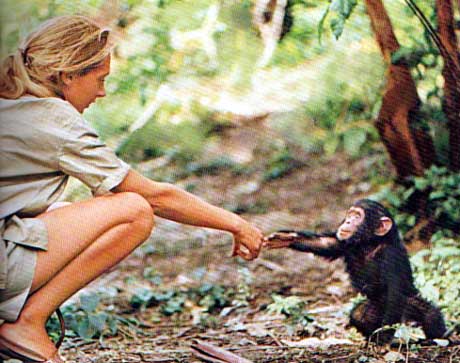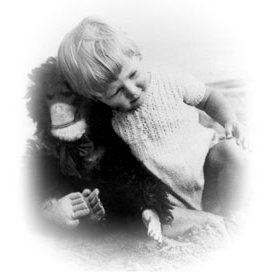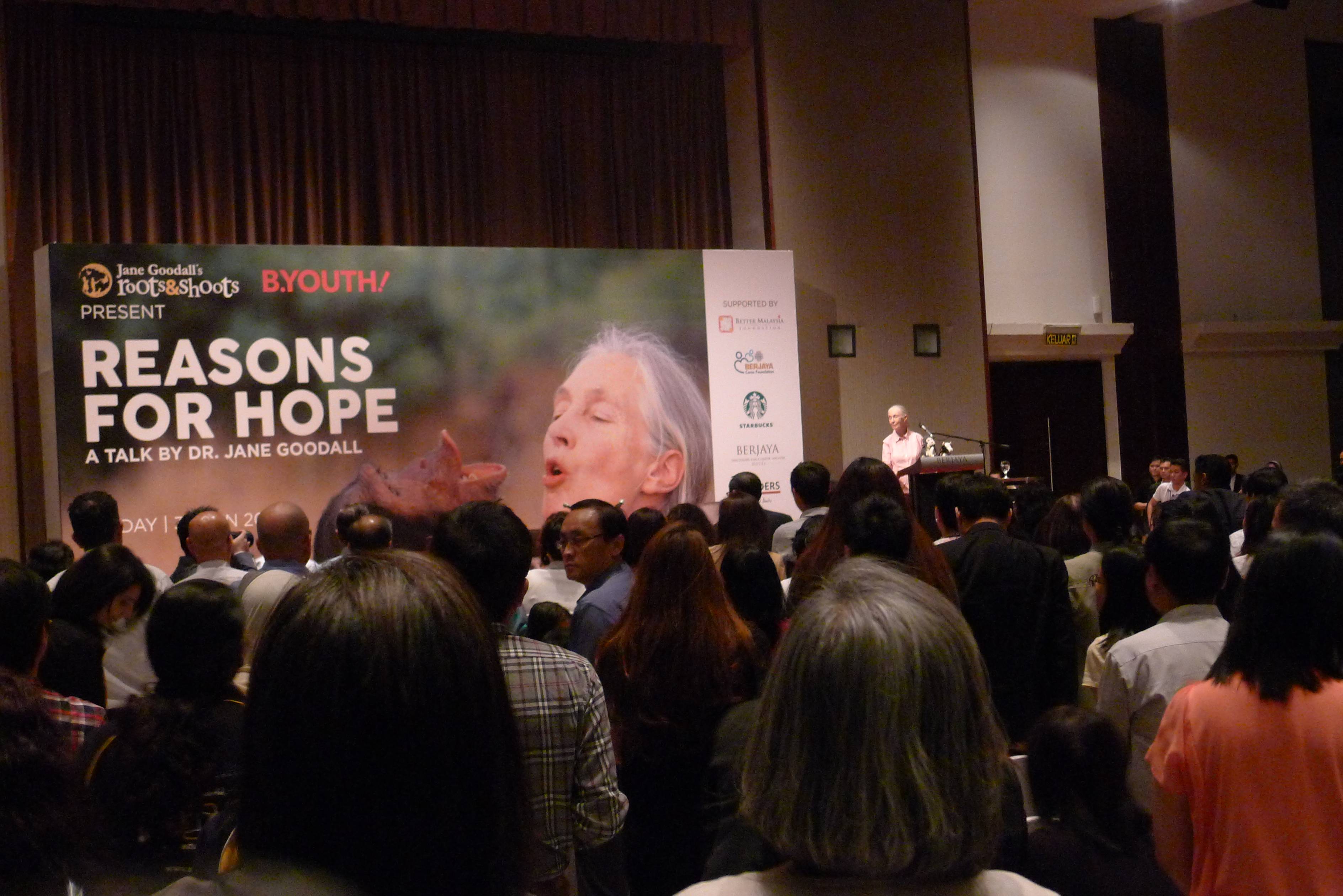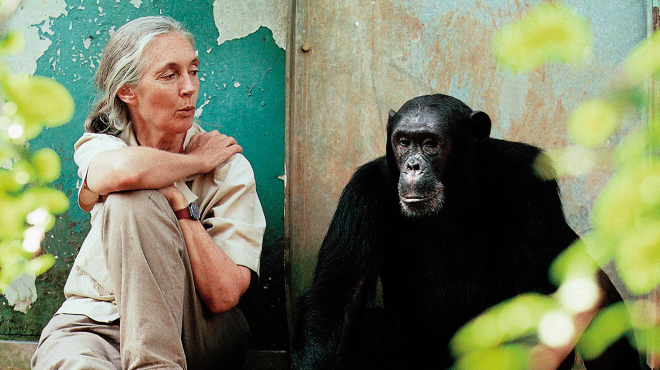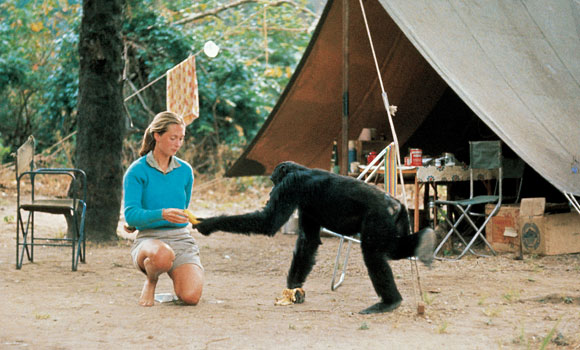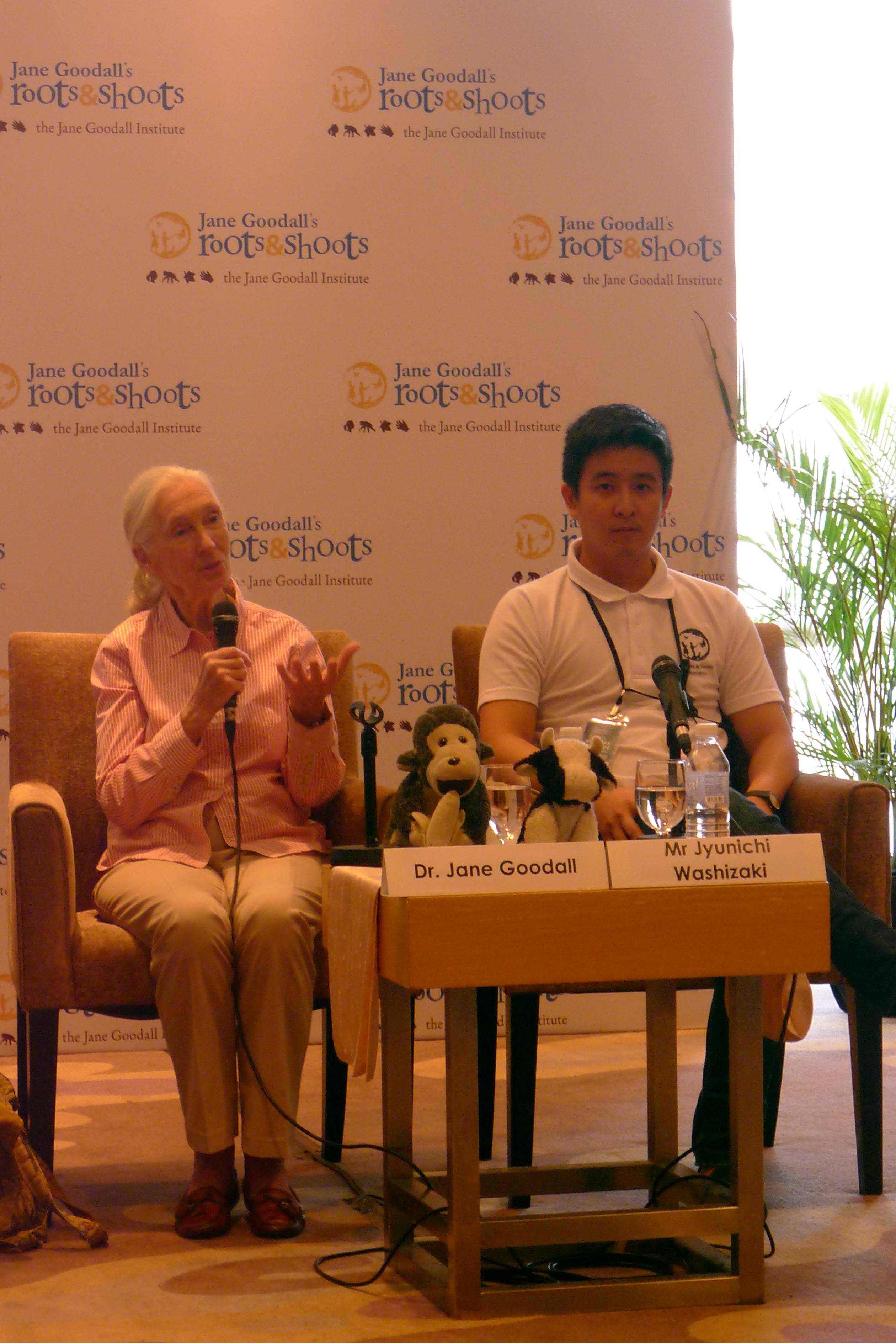12 Unforgettable Things Jane Goodall Said In Her First Ever Visit To Malaysia
On 30 January 2015, world-renowned primatologist, conservationist, anthropologist and UN Messenger of Peace Dr Jane Goodall entranced a crowd of 2,000 people when a talk titled "Reasons For Hope" at Berjaya Times Square Hotel.
1. World-famous primatologist Dr Jane Goodall started her speech by giving thanks to her mother. A supportive mother who allowed her to play, dream, and imagine was all the reason Goodall had the right mindset, determination and strength to succeed.
“I was born lucky,” Goodall said. “I had a mother who, above all, was supportive.” Goodall said that she loved animals from a very early age, and recalled an episode when, as a child, she emerged from a hen house covered in hay after camping out there for almost four hours to watch a chicken lay an egg. “(My mother) could so easily have gotten angry,” she said, “she could so easily have said, ‘How dare you go out without telling us?’ but instead she sat down to hear my wonderful story of how a hen lays an egg.”
At a press conference later, she elaborated that her mother didn’t mind her getting her hands dirty to satisfy her curiosity. “There’s a sad tendency that parents nowadays don’t want their children to get their hands dirty.” “Had I had a different kind of mother, all of that might have been crushed, and I might not be standing here now.”
2. Leaving for Africa at 23 years old at a time when women travelling alone was taboo, but Goodall's mother ignored all the naysayers and encouraged her to achieve her dreams
Jane said her mother was even accused of being irresponsible for letting a 23-year-old girl travel alone. "Thankfully, my mother didn't listen to them."
3. "If you really want something, you must work really hard, you must take every opportunity, and you must never give up."
Jane Goodall shared her mother's advice to everyone in the audience, and repeated in several times throughout her speech, reminding people to never give up even when times are bleak.
4. Goodall fell in love with Tarzan at a very young age, but he married the wrong Jane
Goodall had the crowd in stitches when she reminisced her childhood fascination of reading Tarzan. "I fell in love with Tarzan, king of the apes, and what did he do? He married the wrong Jane," she joked.
5. Goodall saw the beauty and magic even in the most difficult of situations
When she set foot for African, it was supposed to be a 10-day boat journey to Kenya, but due to the ongoing warfare, the journey took 3 weeks. It sounded like a long and tiring trip, but Jane's eyes lit up when she told us of how magical the journey was. She was able to see the cold grey European sea turn warm and sunny, she recalled the excitement of seeing the first flying fish, and of the first dolphin that approached the boat.
She also told us of the back-breaking work of digging for fossils under the hot sun during her first job in Kenya. "It was hard work." "I held up the fossil thinking this was once alive, this once stood where I am standing now today, but in a totally different world." Jane recalled. "How magical it was."
6. Differences do not matter, Goodall said. What matters is that people work together to achieve great things.
"Some people believe in evolution, some don't. That doesn't matter. What matters is that we have evolved. We've evolved, made a mess in this world, and now we have to clean it up."
7. Chimpanzees are much similar to us than we realise. Just like us they kiss and embrace, and just like us, they have power struggle and warfare.
Kissing, embracing, holding hands, patting, begging for food — these gestures we share, they mean the same thing,” she said. However, Goodalll also pointed out that not all chimpanzee behaviour is sweet. She illustrated the shifting tides of monkey politics: power struggles between alpha males of the troop, alliances to defeat opponents. Chimpanzees have a “dark side” to their nature, she warned, describing patrols by male chimps to attack outsiders and expand their territory. “They’re capable of violence, brutality, and even a kind of primitive war.”
8. Man is ironic. They are the most intelligent creature on the planet yet they are destroying their own home.
Goodall said that she felt “shame, anger, and depression” when she thought about what humans are doing to the environment, and reflected that it was ironic that man “as the most intelligent creature on the planet is destroying its own home.” Since founding Roots & Shoots in 1991 in Tanzania, Goodall has travelled all over the world to speak about and spread the word on the initiative which now has chapters all over the world.
9. There is a disconnect between the intelligent human brain and the human heart. It is only when the brain is linked to the heart can we achieve our full potential.
"Isn't it peculiar, that the creature with the most intelligence compared with anything else that ever walked on the planet, is destroying its only home," she said of human beings. "It’s bizarre, does it mean we don't care about the future of our children? But it is not that we don't care about our children, we do, we care. So there is a peculiar disconnect between this very clever brain and human heart," she said of the lack of will to address climate change.
10. Making a difference could be as easy as shopping smarter
Consumers need to question their purchasing decisions and ask if what they buy will contribute to a better world, renowned primatologist, conservationist and anthropologist Dr Jane Goodall said today speaking for the first time in Malaysia. "How is this product made? Where did it come from? Did it involve child slavery or child labour? Did it involve cruelty to animals? Did it help the environment? "If you start thinking like that, you find that these little choices do make a difference."
She tied in the choice to eat less meat as one of the ways consumers could make a decision in favour of the environment, noting that farming of meat to meet demand sometimes involved animal cruelty and contributed to the clearing of forests to make way for the livestock industry. "As a nation gets wealthier, more and more people eating more meat is a sign of wealth, we cramp these animal in terrible factory farm."
11. Youths feel hopeless because they think that the older generation have jeopardised their future. There is much to still be hopeful for, Jane said as she concluded her talk.
The four main reasons she gave were the resilience of nature that springs back given the right conditions, the human brain that has the potential to think and implement ways to save the environment, the human spirit that never give up, and the power of social media in rallying efforts.
12. One of the most surprising messages that took us aback was when Goodall asked us to stop "thinking global, acting local". Instead, think local, act local.
According to Goodall, thinking global and acting local has a paralysing effect. When you think global, you are inundated by the scale of destruction and the miniscule difference that you can see. When you act think and act local, you are focused improving a little part of your community, and you can see the difference. When everyone in every corner of the world act local, all the pieces of the puzzle fit together and we will see a global change.
feminist.comAlthough Jane Goodall travels 300 days in a year, this is the 81-year-old's first visit to Malaysia. During the press conference, we asked Goodall what took her so long to visit Malaysia.
"Because I'm so busy!" says Goodall. Goodall tells us that she is booked years in advance for her talks around the world. She used to visit China once a year, but when Latin America entered the picture, travelling in between continents became too difficult. Her inaugural visit to Malaysia, supported by the Berjaya Youth (B. Youth) was six years in the making.
Goodall was here to launch Roots & Shoots Malaysia, a youth programme she founded in Africa in 1991 under the Jane Goodall Institute. With more than 150,000 members across 130 countries, Roots & Shoots is about empowering youths to make positive change for people, animals and the environment.
